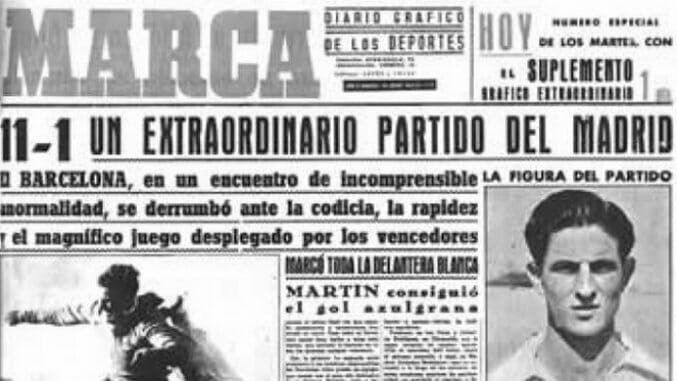The year 2016 has been pretty awful, all things considered. However it’s worth putting in perspective. Consider 1943: a year which saw the Holocaust hit a grotesque peak while the Allies stood and watched, when race riots erupted throughout the US, and a massive famine gripped India.
The year 1943 was also a difficult one for Spain. Following the end of the Spanish Civil War, General Franco, the fascist autocrat who ruled the country for four decades, was consolidating his power. While Franco was sympathetic to Hitler, Spain did not join the Axis powers, and Franco managed to negotiate a neutral status. Instead, he turned his designs inward and worked to establish for himself a permanent perch at the head of political and cultural life in Span.
One site of Franco’s power was football, which El Caudillo had bent into a tool to establish his dominance over Spanish culture. The Copa del Rey had been renamed the Copa del Generalísimo, and Real Madrid became Franco’s favorite instrument of his power— one which he would use to beat down any insurgency on the football pitch before swatting them down politically.
This week, we look back at the 1943 Copa del Generalísimo semifinals— proof that sports and politics are incontrovertibly linked.
There isn’t a lot decent footage of this cup tie available, and the above video is just about the best you’ll be able to find on YouTube. (Most other videos either peddle in absurd conspiracy theories or are just foul-mouthed ranty defenses of Franco.)
The top-line part of the story is pretty simple. Barcelona beat Real Madrid in the first leg of the semifinal tie 3-0. Madrid complained about the referee and Barcelona fans. In the days between the first and second legs, Spanish media, under Franco’s direction, cast Barcelona fans as enemies of the regime. This wasn’t just a football matter, after all; El Clásico was a relitigation of the Civil War, and Barcelona was a symbol of Catalan resistance. A loss for Real Madrid was a loss for Franco, for Spain, and even for Christendom.
Barcelona fans were banned from attending the second leg. In a statement released after the match, Real Madrid president Ramón Mendoza explained his reasoning:
”The message got through that those fans who wanted to could go to El Club bar on Calle de la Victoria where Madrid’s social center was. There, they were given a whistle. Others had whistles handed to them with their tickets.”
As author Jimmy Burns wrote, Franco’s state security director visited Barcelona’s dressing room before kickoff in the second leg and offered a very pointed team talk. “Do not forget that some of you are only playing because of the generosity of the regime that has forgiven you for your lack of patriotism,” the director is said to have told the squad.
What followed was quite possibly one of the most shameful episodes in football history. Presumably fearing for their lives and the safety of their families, Barcelona let Real Madrid have their way. Already up 2-0 by the half-hour mark, Real Madrid scored another six goals between the 31st and 44th minutes, making it 8-0 at halftime.
Back in the dressing room, Barcelona players had all but decided not to go back out for the second half. But according to a few squad members in interviews given years later, a military officer came to them in the dressing room and told them they would be thrown in jail if they didn’t finish the match.
Real Madrid won the second leg 11-1 and 11-4 on aggregate.
Jose Antonio Samaranch, future president of the International Olympic Committee, was working as a sports journalist for La Prensa at the time. He wrote this about the game:
”Barcelona did not exist and the same would have happened to any team. In that atmosphere and with a referee who wanted to avoid any complications, it was humanly impossible to play… If the azulgranas had played badly, really badly, the scoreboard would still not have reached that astronomical figure. The point is that they did not play at all.”
Samaranch lost his job after that.
The Royal Spanish Football Federation fined both clubs 2500 pesetas. Even media outlets who supported Franco decried the ludicrous display. Real Madrid went on to lose to Athletic Bilbao 1-0 in the final.
Fans and observers cite this game as foundational in the history of El Clásico and the turning point where both sets of fans started to really, actively hate each other. It was at this point that it stopped being a simple football rivalry. It was also at this point that Barcelona became, well, more than a club. It became a symbol both of Catalan independence and identity and a mode of resistance against fascism. Barcelona became a model for football as a response to oppressive regimes— something which may become very relevant for American soccer fans in the years to come.
The next instalment of El Clásico kicks off Saturday at the Camp Nou. (10:15am Eastern on beIN Sports.) While Saturday’s clash won’t be as politically fraught as it historically has been, the shadows of 1943 will undoubtedly hang over the proceedings. As always, El Clásico is never just about the football. But then again, football is never just about the football.
